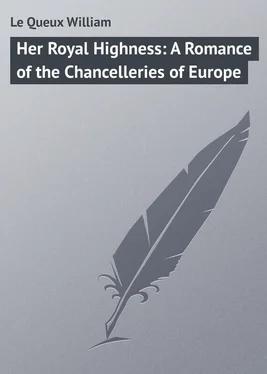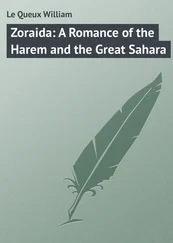William Le Queux - Her Royal Highness - A Romance of the Chancelleries of Europe
Здесь есть возможность читать онлайн «William Le Queux - Her Royal Highness - A Romance of the Chancelleries of Europe» — ознакомительный отрывок электронной книги совершенно бесплатно, а после прочтения отрывка купить полную версию. В некоторых случаях можно слушать аудио, скачать через торрент в формате fb2 и присутствует краткое содержание. Жанр: foreign_prose, на английском языке. Описание произведения, (предисловие) а так же отзывы посетителей доступны на портале библиотеки ЛибКат.
- Название:Her Royal Highness: A Romance of the Chancelleries of Europe
- Автор:
- Жанр:
- Год:неизвестен
- ISBN:нет данных
- Рейтинг книги:4 / 5. Голосов: 1
-
Избранное:Добавить в избранное
- Отзывы:
-
Ваша оценка:
- 80
- 1
- 2
- 3
- 4
- 5
Her Royal Highness: A Romance of the Chancelleries of Europe: краткое содержание, описание и аннотация
Предлагаем к чтению аннотацию, описание, краткое содержание или предисловие (зависит от того, что написал сам автор книги «Her Royal Highness: A Romance of the Chancelleries of Europe»). Если вы не нашли необходимую информацию о книге — напишите в комментариях, мы постараемся отыскать её.
Her Royal Highness: A Romance of the Chancelleries of Europe — читать онлайн ознакомительный отрывок
Ниже представлен текст книги, разбитый по страницам. Система сохранения места последней прочитанной страницы, позволяет с удобством читать онлайн бесплатно книгу «Her Royal Highness: A Romance of the Chancelleries of Europe», без необходимости каждый раз заново искать на чём Вы остановились. Поставьте закладку, и сможете в любой момент перейти на страницу, на которой закончили чтение.
Интервал:
Закладка:
“Oh, I don’t know. This beastly heat makes me sick,” and he gave a vigorous stroke with his horsehair fly-whisk with which each traveller was provided. Beelzebub assuredly lived in Egypt, for was he not the god of flies. Everything has a god in Egypt.
Boulos had resumed his comfortable chat with Melek, the reis . His thousand piastre deal of that morning had fully satisfied him. Not that he ever overcharged the travellers for any antiques which he sold them. As everyone on the Nile knows – from Cairo to far Khartoum – Boulos the laughing, easy-going though gorgeously attired dragoman, is a scrupulously honest dealer. He is a friend of the greatest Egyptologists in the world and, unlike the common run of dragomans, has studied Egyptian history, and possesses quite a remarkable knowledge of hieroglyphics. Many a well-known European professor has sat at the knee of Boulos, and many an antique is now in one or other of the European national collections which originally passed through the hands of the ever-faithful Boulos.
Waldron was sipping an innocuous drink composed of Evian water with a lime squeezed into it, and chatting in French with old Jules Gigleux, passing one of those usual mornings of laziness, away from the worries of letters and newspapers, which are so delightful up the Nile.
Beneath the wide awning the soft, hot breeze pleasantly fanned them, while away on the banks rose the feathery palms on the tiny green strip of cultivated mud, sometimes only a few feet in width, and then the desert – that great glaring waste of brown sand – stretching away to the horizon where the sky shone like burnished copper.
Mademoiselle, as full of mischief as ever, was the very life and soul of that smart party of moneyed folk which included two English peers, three American millionaires, an Austrian banker, a wealthy Russian prince, and two Members of Parliament who had paired. It had been whispered that she was daughter of Duprez, the millionaire sugar-refiner of Lyons; and, as everyone knows, the sugar of the Maison Duprez is used in nearly every household throughout France.
Yet Waldron had heard quite a different story from her own lips while they had been seated together on deck the previous evening drinking coffee.
“Ah?” she had sighed, “if I were only wealthy like the several other girls of this party, it would be different. Perhaps I could break away from uncle, and remain independent. But, alas! I cannot. I owe everything to him – I am dependent upon him for all I have.”
This surprised Hubert considerably. Hitherto he had believed her to be the daughter of a wealthy man, because Miss Lambert showed her such marked deference. But such apparently was not the fact. Indeed she had declared later on to Waldron that she was very poor, and to her eccentric old uncle she was indebted for everything she received.
Hers was a curious, complex character. Sometimes she would sit and chat and flirt violently with him – for by her woman’s intuition she knew full well that he admired her greatly – while at others she would scarcely utter a word to him.
Hubert Waldron detested old Gigleux. Even though he sat chatting and laughing with him that morning, he held him in supreme contempt for his constant espionage upon his niece. The old fellow seemed ubiquitous. He turned up in every corner of the steamer, always feigning to take no notice of his niece’s constant companionship with the diplomat, and yet his sharp, shrewd eyes took in everything.
On more than one occasion the Englishman was upon the point of demanding outright why that irritating observation was so constantly kept, nevertheless with a diplomat’s discretion, he realised that a judicious silence was best.
That long, blazing day passed slowly, till at last the sun sank westward over the desert in a flame of green and gold. Then the thirty or so passengers stood upon the deck waiting in patience till, suddenly rounding the sharp bend of the river, they saw upon the right – carved in the high, sandstone cliff – the greatest and most wonderful sight in all Nubia.
Lola was at the moment leaning over the rail, while Waldron stood idly smoking at her side.
“See!” he cried suddenly. “Over there! Those four colossal seated figures guarding the entrance of the temple which faces the sunrise. That is Abu Simbel.”
“How perfectly marvellous!” gasped the girl, astounded at the wonderful monument of Rameses the Great.
“The temple is hewn in the solid rock – a temple about the size of Westminster Abbey in London. In the Holy of holies are four more seated figures in the darkness, and to-morrow as we stand in there at dawn, the sun, as it rises, will shine in at the temple door and gradually light up the faces of those images, until they glow and seem to become living beings – surely the most impressive sight of all the wonders of Egypt.”
“I am longing to see it,” replied the girl, her eyes fixed in fascination at the far-off colossi seated there gazing with such calm, contented expression over the Nile waters, now blood-red in the still and gorgeous desert sunset.
On the arid banks there was no sign of life, or even of vegetation. All was desert, rock, sand, and desolation. Where was the great, palpitating civilisation which had existed there in the days of Rameses, the cultured world which worshipped the great god, Ra, in that most wonderful of all temples? Gone, every trace save the place where the sun god was worshipped, swept out of existence, effaced, and forgotten.
Over the vessel a great grey vulture hovered with slowly flapping wings. Then from the bows came a low chant, and the passengers craning their necks below, saw that the black-faced crew had turned towards Mecca and sunk upon their knees, including even the gorgeous Boulos himself, and with many genuflexions were adoring Allah.
“Allah is great. Allah is merciful. He is the One,” they cried in their low, musical Arabic. “There is no god but Allah!”
The sun sank and twilight came swiftly, as it does in the glowing, mystic East. And the white-bearded reis , his prayers finished, pushed on the steamer more quickly so as to anchor opposite Abu Simbel before darkness fell. The excitement among the passengers grew intense, for, on the morrow, ere the first pink of the dawn, the travellers were to stand within that rock-hewn temple, the most wonderful of all the works of the Pharaohs.
The evening proved a merry one, for after dinner, with the vessel anchored in mid-stream – to obviate thieves – opposite the great temple, the Nubian crew gave a fantasia, or native song and dance, for the benefit of the travellers.
On each trip from Shellal to Wady Haifa this was usual, for European travellers like to hear the weird native music, and the crooning desert songs in which Allah is praised so incessantly. Besides, a collection is made afterwards, and the sturdy, hard-working crew are benefited by many piastres.
On the lower deck, beneath the brilliant stars the black-faced toilers of the Nile beat their tom-toms vigorously and chanted weirdly while the passengers stood leaning over, watching and applauding. The crew squatted in a circle, and one after the other sprang up and performed a wild, mad dance while their companions kept time by clapping their hands or strumming upon their big earthenware tom-toms.
Then at eleven, the hour when the dynamos cease their humming and the electric light goes out, the concert ended with all the crew – headed by the venerable, white-bearded old pilot – standing up, salaaming and crying in their broken English:
“Gud nites, la-dees and gen’lemens. Gud nites?”
It was just before three on the following morning when the huge gong, carried around by an Arab servant, aroused everyone, and very soon from most of the cabins there turned out sleepy travellers who found the black giant Hassan ready with his little cups of delicious black coffee.
Читать дальшеИнтервал:
Закладка:
Похожие книги на «Her Royal Highness: A Romance of the Chancelleries of Europe»
Представляем Вашему вниманию похожие книги на «Her Royal Highness: A Romance of the Chancelleries of Europe» списком для выбора. Мы отобрали схожую по названию и смыслу литературу в надежде предоставить читателям больше вариантов отыскать новые, интересные, ещё непрочитанные произведения.
Обсуждение, отзывы о книге «Her Royal Highness: A Romance of the Chancelleries of Europe» и просто собственные мнения читателей. Оставьте ваши комментарии, напишите, что Вы думаете о произведении, его смысле или главных героях. Укажите что конкретно понравилось, а что нет, и почему Вы так считаете.












